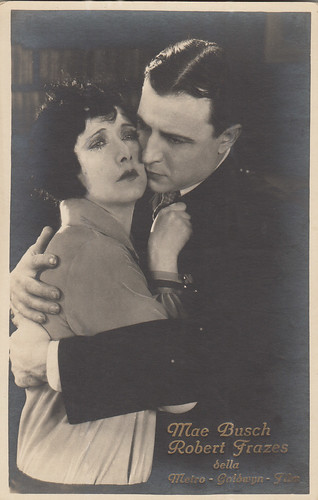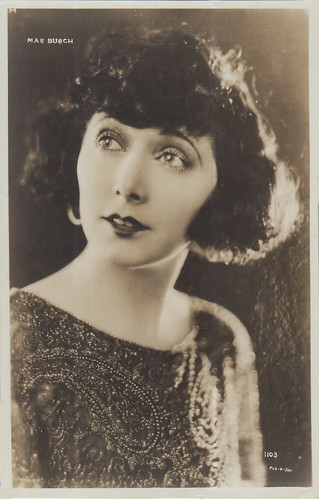I’m sick and tired of cooking to you and all the bums that you happen to bring up here for dinner. And I’m not going to do it any longer. (From Unaccustomed As We Are).
I warn you, Oliver Hardy: you go out with that Laurel again and I’m through. You get me? (From Their First Mistake).
If you think you’re going off gallivanting with a lot of hoodlums to any convention whenever you want to, well you’re not. Not for a minute you’re not. (From Sons of the Desert).
You big bag of suet. I told you five minutes ago not to talk to me. I told you an hour ago. I told you a week ago. I suppose you think you can contradict everything I say? Well you can’t, you can’t, you can’t. You never will. (From The Bohemian Girl).
She was also not averse to breaking different objects over his head or chasing him away with a broom. Even when she was reduced to small roles later in her career, Mae never lost her knack for delivering a line. For example, in Ziegfeld Girl (1941), she played Jenny, the wardrobe lady. In a scene, Hedy Lamarr, before going on stage in a Ziegfeld show, complains to Jenny that she is too nervous to put her lipstick on, to which she wittily replies: Relax honey. They won’t be looking at your mouth.

British postcard in the Famous Cinema Stars Series by Beagles, no. 130 V. Photo: Universal.

Vintage postcard. Mae Busch (on the left) and Maud George (in the centre) in Foolish Wives (Erich von Stroheim, 1922). The postcards in this series have no caption on the front. On the back, a printed text in Spanish advertises the release of Foolish Wives and bears the mention “La Sud Americana”. German company Ross Verlag most likely produced them for the South American market, as these postcards look the same as the Foolish Wives set of postcards issued by Ross.
A seasoned stage performer
Mae Busch was born Annie May Busch on 18 June 1891 in Melbourne, Australia.
Her parents were Vaudevillians Frederick William Busch and Elizabeth Maria Lay.
Her mother would often use the pseudonym Dora Devere during her stage career.
At the end of the 19th Century, the family relocated to the U.S.A., where Mae was placed in a convent school in New Jersey.
In 1903, she joined her parents in a Vaudeville act called The Busch Revere Trio which lasted until 1912. Mae also appeared on her own in several plays and shows.

British postcard in the Picturegoer Series, London, no. 79.
Keystone comedies
Mae Busch made her official film debut in 1915 at Keystone, where she appeared opposite comedians such as Charley Chase, Chester Conklin, Mack Swain, Harry McCoy and William Collier Sr.
Her films include Ambrose’s Sour Grapes (1915), Love in Armour (1915), The Rent Jumpers (1915), Merely a Married Man (1915), A Rascal’s Wolfish Ways (1915), Because He Loved Her (1916), Better Late Than Never (1916), Wife and Auto Trouble (1916) and A Bath House Blunder (1916).
According to some sources, Mae allegedly would have had an affair with Keystone’s boss Mack Sennett, much to star Mabel Normand’s dismay.
But it seems that neither Busch nor Normand ever made a public comment about it.
So, we will probably never know the long and short of this story.

Mexican postcard by CIF, no. 1900.

German postcard by Verlag Ross, Berlin, no. 1203/1, 1927-1928. Photo: Ufa.
Big breaks with Erich von Stroheim
After leaving Keystone, Mae appeared in two other shorts at IMP and Fox and made her feature film debut in a Vivian Martin vehicle, The Fair Barbarian (1917).
She then played a villain opposite famous magician Harry Houdini in The Grim Game (1919).
She got a break when Erich von Stroheim gave her a role in The Devil’s Passkey (1920).
After having supported Enid Bennett in Her Husband’s Friend (1920), Wanda Hawley in The Love Charm (1921) and Marie Prevost in A Parisian Scandal (1921), she was again directed by Erich von Stroheim in Foolish Wives (1922).
Mae played an adventuress passing for a Russian countess. Foolish Wives was one of the 1922 box-office winners.

Italian postcard by G.B. Falci Editore, Milano, no. 421. Photo: Metro-Goldwyn. Mae Busch and Robert Frazer in Bread (Victor Schertzinger, 1924).
At the top of her career
Mae Busch’s career was in the ascent when she was chosen for the leading role of Glory Quayle in The Christian (1923).
It had been a best-selling novel, before becoming a Broadway success for actress Viola Allen during the 1898-1899 season and had already been adapted for the screen three times before.
For two years, she was at the top of her career by starring in movies such as Name the Man! (1924), A Woman Who Sinned (1924), Bread (1924), Broken Barriers (1924), Married Flirts (1924), Frivolous Sal (1925), Camille of the Barbary Coast (1925), Time, the Comedian (1925), etc.
She was also directed by Tod Browning in The Unholy Three (1925), opposite Lon Chaney.

Mexican postcard, no. 1103.

Swedish postcard by Förlag Nordisk Konst, no. 1321.
Minor Hollywood studios
From 1926 on, Mae Busch mostly got starring parts at minor Hollywood studios such as Tiffany in Fools of Fashion (1926), Husband Hunters (1927) and The Beauty Shoppers (1927).
For Sterling Pictures, she starred in Tongues of Scandal (1927) and for Gotham in San Francisco Nights (1928). For Carlos Productions, she appeared in Black Butterflies (1928).
Still, she occasionally had the opportunity to appear in more prestigious productions, like Universal’s Perch of the Devil (1927).
Mae also acted in Fox’s Fazil (1928), supporting Greta Nissen and Charles Farrell.
In M.G.M.’s While the City Sleeps (1928), she was reunited with director Tod Browning and co-star Lon Chaney.

Spanish postcard in the Kursaal series.
The advent of the talkies
Mae Busch made her talking debut in Roland West’s gangster melodrama Alibi (1929), which was nominated in the Academy Award Best Picture category.
After the advent of sound, Mae appeared, until her death, in dozens of movies in supporting parts.
Over the years, the supporting parts became bit roles, several of them uncredited.
It’s a pity that, except for Hal Roach, directors or producers didn’t usually give her meatier roles.

Spanish postcard by Editorial Fotografica Barcelona, no. A-123. Mae Busch in The Unholy Three (Tod Browning, 1925).

French postcard by J.R.P.R., no. 200. Photo: Metro-Goldwyn.
Her work with Laurel and Hardy
In 1927, Mae Busch headed the cast of the Hal Roach comedy Love’Em and Weep (1927). In it, Stan Laurel tried to keep a blackmailing Mae away from his married friend, played by James Finlayson, and Oliver Hardy had a bit part as a judge.
By 1929, Laurel and Hardy had become a hugely popular team and Hal Roach then got the good idea to have Mae Busch play Hardy’s strong-willed and domineering wife in Unaccustomed As We Are (1929). With her experience and perfect comic timing, she proved to be a perfect screen partner for Stan and Oliver.
She was again Hardy’s bickering wife in Their First Mistake (1932), Sons of the Desert (1933) and The Bohemian Girl (1936).
Her other films with the pair are Chickens Go Home (1931), as Hardy’s blackmailing old flame, Come Clean (1931), as a woman they save from suicide who not only proves to be a troublemaker but a fugitive from the police as well, Oliver the Eight (1934), as a mentally disturbed murderess who intends to kill Oliver, Going Bye-Bye! (1934), as a gangster’s moll, The Live Ghost (1934), as Maisie the Vamp, Them Thar Hills (1934) and its sequel Tit for Tat (1935), as wife to a suspicious Charlie Hall, and The Fixer Uppers (1935), as a woman distraught over her husband’s neglect.
Several sources claim that she would have sued Hal Roach for feet injuries sustained during filming The Bohemian Girl but she would have lost the case. In any event, she never worked for Hal Roach again.

British postcard, no. 16.
Final years
In December 1940, Mae Busch was one of the many guests at the opening of the Mabel Normand Sound Stage at Republic Studios. It still survives today in Studio City, Los Angeles.
Mae Busch passed away on 20 April 1946, from colon cancer. At the time of her death, she was still married to Thomas Tate, her third husband.
For unknown reasons, her ashes remained unclaimed for many years.
In the 1970s, The 'Way out West Tent', a chapter of the 'Sons of the Desert', a famous Laurel and Hardy appreciation society, saw to it that her ashes would be transferred to the Los Angeles Chapel of the Pines crematory and columbarium.
In the 1950s, she became the subject of a running gag in Jackie Gleason’s television shows. Naming the casts of old pictures, he always wound up with "and the ever-popular Mae Busch".

British postcard issued with Sarony cigarettes, no. 26 of a series of 38 cinema stars.

Autographed photograph.
Text and postcards: Marlene Pilaete.
No comments:
Post a Comment